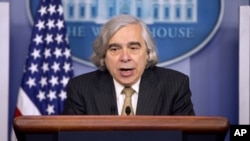The Obama administration is making a push to sell to the public the framework Iran nuclear deal reached recently, before members of Congress return from a holiday recess next week. At a White House briefing Monday, U.S. Energy Secretary Ernest Moniz, who played a key role at the international Iran nuclear talks in Switzerland, came to the podium to tell reporters the preliminary agreement would shut down all pathways Iran could have to produce a nuclear bomb.
A “Forever” Agreement
Moniz said the deal is a “forever” agreement that would provide the International Atomic Energy Agency with unprecedented access and transparency to all of Iran’s nuclear installations - declared and undeclared - over a long period of time, not a certain number of years. Asked if he trusts Iran’s leaders to negotiate a deal in good faith, Moniz said the agreement is not based on trust, but on the most inspections to which any country has ever been subjected. He said the agreement is meant to be long-term, with a number of phases.
No Agreement on When Sanctions Should Be Lifted
Taking back the podium, White House press secretary Josh Earnest admitted that no agreement has been reached with Tehran on when international and U.S. sanctions would be lifted. Negotiators have until June 30 to complete a final, comprehensive deal. Iranian officials say they expect sanctions to immediately be lifted after a final agreement has been reached. Earnest, however, said the United States believes that the lifting of sanctions should be phased in gradually, after Iran completes various levels of compliance as set out in the deal.
Open Conflict Over Congress’ Role
Asked about Congress’ role in the Iran deal, Earnest said President Barack Obama has the authority under the Constitution to negotiate on behalf of the United States and to enter into international agreements such as the Iran nuclear deal. He said the president would keep congressional leaders informed of the progress in the negotiations, but urged Congress to wait until the final June deadline before passing any legislation on the agreement.
Watch video report from VOA's Zlatica Hoke:
Speaking on Fox News Sunday, Senate Foreign Relations Committee Chairman Bob Corker disagreed, saying the American people want Congress to weigh in on a foreign policy shift of this magnitude. Corker said next week, when Congress returns, he plans to bring up legislation that would give the Senate 60 days to vote to approve or disapprove a final deal.
Earnest said the president commends Corker for his “principled stance,” but that they disagree fundamentally on Congress’ role, saying presidents have forged such international agreements for decades.
Earnest: Some Republican Lawmakers Want to Kill the Deal
Earnest said there are some Republican lawmakers - not Senator Corker - who have opposed any deal with Iran from the beginning, and who are just using the excuse that they want to weigh in on it to try to kill it. He said the best example is freshman Republican Senator Tom Cotton of Arkansas, who authored a letter to Iranian leaders warning them about the deal. It was signed by 47 Republican senators.
Republican House Speaker John Boehner said the president called him to discuss the deal, but that there is much more to talk about when Congress returns. Last week, Boehner went on a tour of the Middle East, where he heard the concerns of Israeli Prime Minister Benjamin Netanyahu and others. Netanyahu has rejected the deal, saying it endangers Israel.







